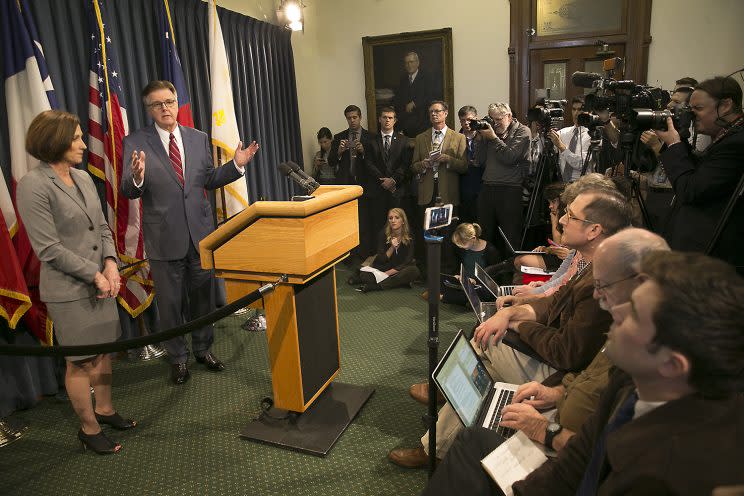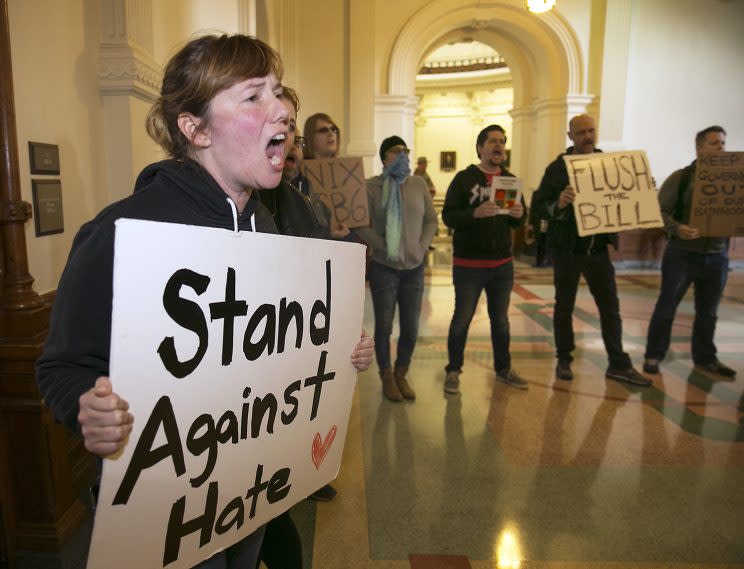‘It’s going to be a tough fight’: GOP Texas lawmakers champion ‘bathroom bill’

Conservative Texas lawmakers are championing a new “bathroom bill” that makes it illegal for transgender people from using bathrooms they feel match their gender identities.
On Thursday, Texas Sen. Lois Kolkhorst, R-Brenham, filed Senate Bill 6, also known as the Texas Privacy Act, which she said provides clear guidance for public schools and government buildings in providing sufficient levels of privacy.
It’s already been denounced for what supporters of the LGBT community consider discrimination against transgender people. Many civil rights groups criticize the legislation’s supporters for peddling what they consider an offensive myth of men claiming to identify as women in order to harass or leer at female bathroom-goers. Law enforcement officials have said such instances are rare or nonexistent.
“I’ve often been asked, ‘Why do we need such a bill?’ It wasn’t that we brought this fight to the people. The fight was brought to us,” she said during a press conference in the Senate Conference Room at the state Capitol in Austin.
Kolkhorst said the bill, which was previously called the Women’s Privacy Act, was written in response to the federal government’s May 2016 “edict” to Texas schools permitting students to use restrooms that align with their “internal sense of gender.”
“The bill requires that each dressing room, locker room and restroom be designated for use by people according to their biological sex,” she said. “Exceptions are allowed for emergencies, custodial purposes, parents of small children and the disabled, among others. The bill also allows school districts to make accommodations upon request by those preferring an alternative arrangement.”
A similar bill in North Carolina, House Bill 2, was roundly denounced by LGBT advocates as discriminatory. It legislated that people can only use bathrooms that correspond with their biological sex as indicated on their birth certificates.

Kolkhorst said she has studied the problem for months and hopes her bill will be a practical, common-sense solution to a sensitive issue. The legislation, she continued, will reserve the right of private businesses to determine their own policies about “these intimate settings.”
“With this bill and in the spirit of free enterprise, Texas businesses are left to make their own decisions on how they want to handle these intimate settings,” she said. “To further defend those decisions, any local government is also prevented from considering these policies when awarding government contracts.”
Protesters who gathered at the state Capitol held signs with slogans such as “Nix SB6” and “Flush the bill” and booed as the press conference proceeded.
Lt. Gov. Dan Patrick said Senate Bill 6 is not about discrimination and praised it as an instance of standing up for “common decency.”
“The people of Texas elected us to stand up for common sense, common decency and public safety. This legislation is supported by an overwhelming majority in every poll of Texas, from both parties, Republicans and Democrats, from Hispanics, African-Americans, Anglos, men and women,” he said at the press conference.
“You can mark today as the day that Texas draws a line in the sand and says ‘No, the privacy and safety of Texans is our first priority — not political correctness.”
He dismissed suggestions that passing a bathroom bill would result in financial fallout and touted Texas’ position as one of the largest economies in the world.
“We know it’s going to be a tough fight. The forces of fear and misinformation will pull out all the stops, both in Texas and nationally,” Patrick said. “But we know we’re on the right side of the issue and the right side of history.”
Rebecca Robertson, the legal and policy director of the ACLU of Texas, released a statement saying it’s shocking that the lieutenant governor would be so dedicated to pursuing a bathroom bill after the “debacle in North Carolina.”
“It’s unnecessary, discriminatory and inconsistent with the constitutional value of equal protection for all,” Robertson said. “And that’s to say nothing of the havoc it will wreak on the Texas economy should it pass. Make no mistake — the invidious intent of SB6 is to deny transgender Texans the ability to participate in public life.”
Her colleague, Terri Burke, executive director of the ACLU of Texas, released a similar statement:
“The Texas State Legislature has exactly one constitutionally assigned duty: to pass a budget. If they’re planning on spending the session on SB6 and spiteful legislation like it, we’d much rather they restrained themselves to that one duty, packed up their circus tents and went home. But if the Lieutenant Governor is truly worried about the safety of women and children, he would cease his assaults on women’s well-being, repair Texas’s moribund CPS program, and see to the millions of uninsured children whose lives and futures have been compromised by our lawmakers’ warped priorities.”



